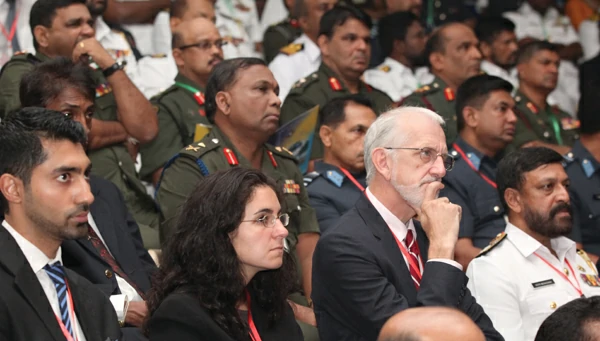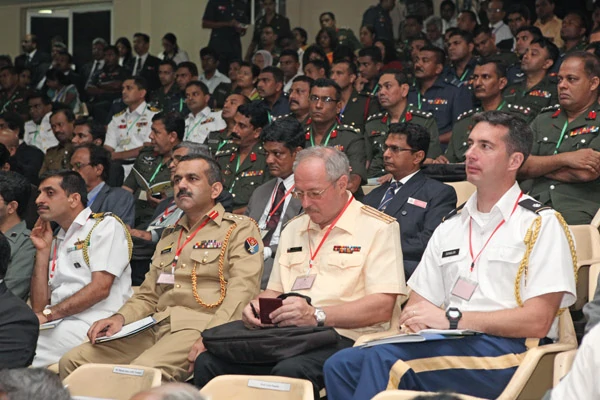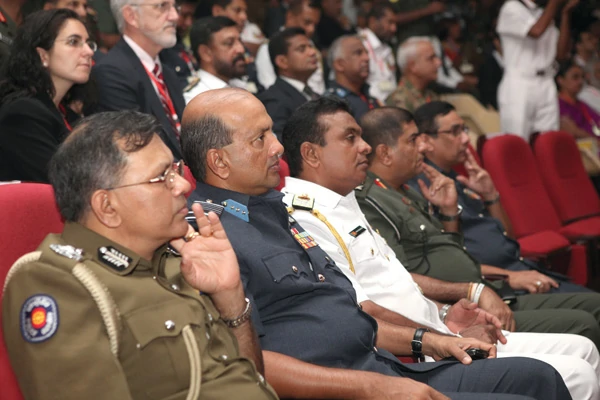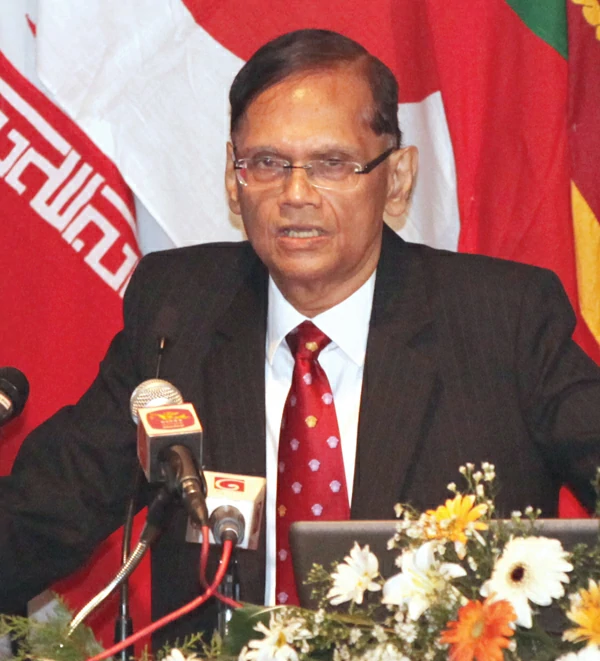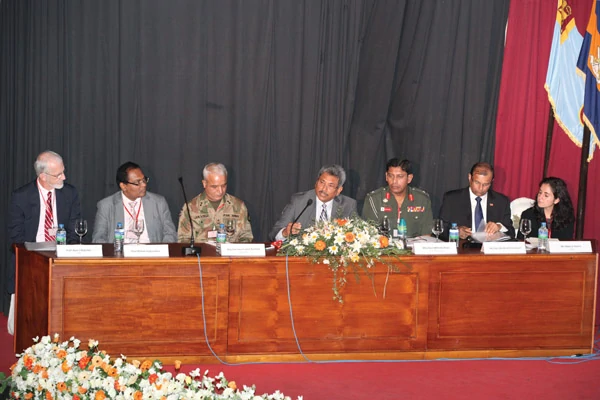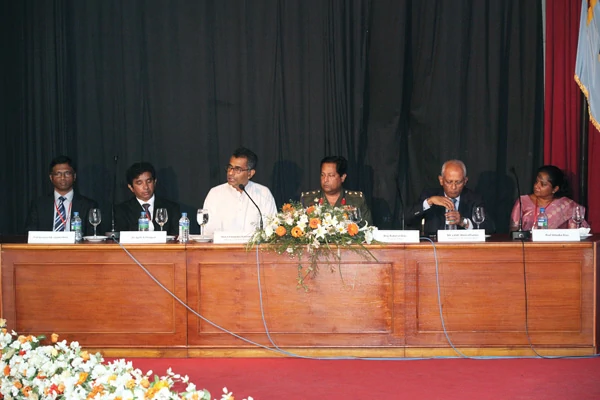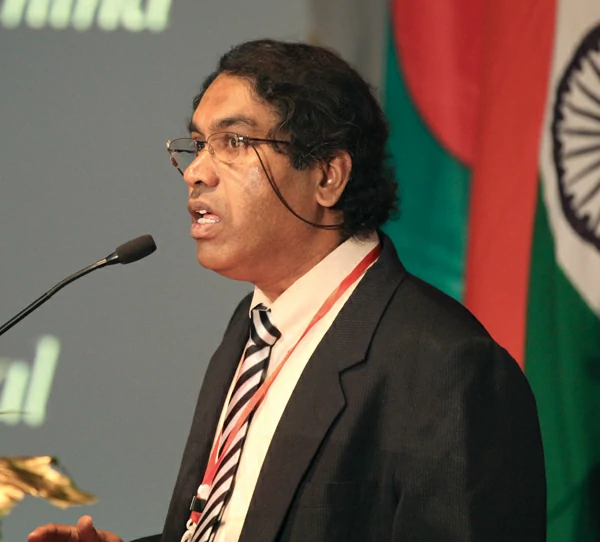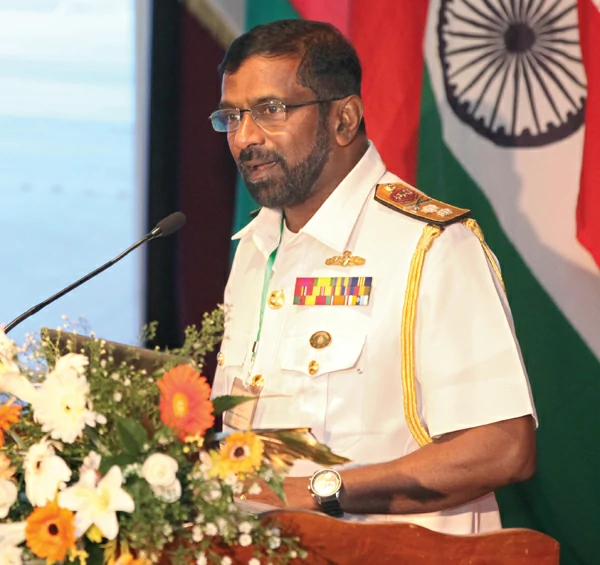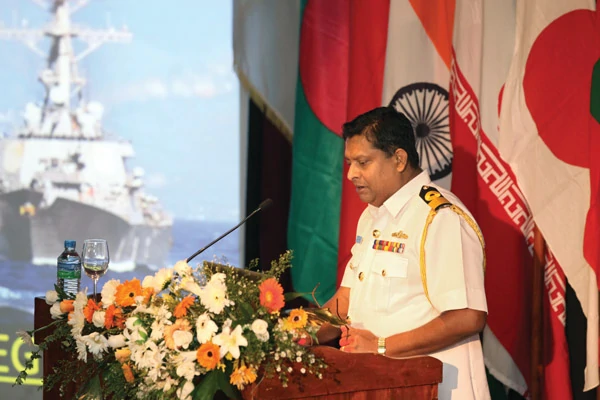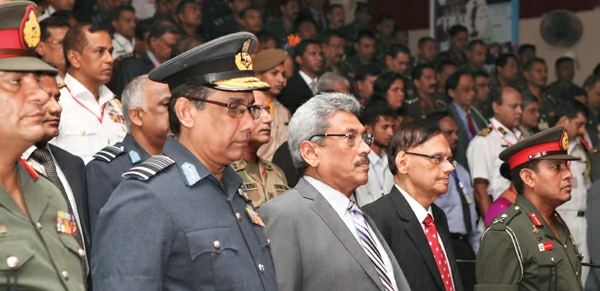
The annual Symposium of the General Sir John Kotelawala Defence University provided the opportunity for professionals and academics, both from Sri Lanka and overseas, to come together and exchange views and knowledge under the topical theme of “Challenges of Post Conflict Sri Lanka”. At a moment when Sri Lanka is attempting to move ahead in the post conflict era, the theme of the symposium proved timely and provided a forum for discussion and debate.
By Chiranthi Rajapakse and Shehara de Mel
Photography Indika De Silva
The Vice Chancellor of the Kotalawala Defence University (KDU) Major General M P Peiris welcomed all the national and international dignitaries and participants, highlighting that with the cessation of the 30 year war, every attempt has been made to enhance KDU to be a centre of excellence in military education and other relevant disciplines and assume a leading role in the country’s tertiary education in resurgent Sri Lanka. He also explained how this would be essential in overcoming future challenges and striving for further victories in economic, social, cultural, scientific and technological spheres and making Sri Lanka the ‘Wonder of Asia’. “Thus, in this symposium, we should pay our serious and focal attention to reshape and redefine the role of the Armed Forces in the post conflict scenario to enable the country to march towards desired success,” he concluded.
Minister of External Affairs Prof G L Peiris, subsequently addressing the gathering praised the University’s efforts in establishing links with other universities to commence innovative programmes of instruction both at the undergraduate and post graduate levels, and its desire to involve the private sector, civil society and gain the maximum possible strength from available resources. “It is a very opportune initiative on your part and I’m proud and happy to be associated with it,” he stated.
Moving on to the contribution made by the Armed Forces during the period of conflict, Prof Peiris highlighted the political leadership of President Mahinda Rajapaksa, the dedication and perseverance of Defence Secretary Gotabaya Rajapaksa that led to the victory and went on to discuss the allegations in the Darusman Report. The External Affairs Minister’s thoughts on the present reflected those of the Vice Chancellor of KDU of the challenges that may arise in the future and the existence of forces that are now transferring their initiatives from the arena of battle to the field of international action. However, he also highlighted the positive aspects including the growing economy of the country including the development in the post-war North and East, all of which would derive strength and confidence for a bright future.
Speaking of the new role of the Armed Forces, Prof Peiris highlighted the internal and external dimensions of its role. In terms of the internal role, he highlighted the significance of the role of the Armed Forces with respect to the development of infrastructure. Indicating the external dimension on the other hand, he went on to explain the role of the Armed Forces with regard to refugee issues, prevention of collaboration between terrorist groups, ensuring security of sea lanes, prevention of proliferation of weaponry benefitting not only Sri Lanka but also the countries of the region and in turn more broadly, the international community.
Prof Peiris also made some observations on some of the current events occurring around the world and the Sri Lankan Government’s stance that however complex problems may be, they have to be resolved in a manner that is compatible with the culture, traditions and the beliefs of the people of a country and that the lesson learned from the Sri Lankan experience is that these problems cannot be solved with the interventions of external forces. He also pointed out the need for absolute consistency in the application of norms and standards of international law and practice.
Concluding, Prof Peiris stated, “We need to be cerebral – it is the discriminating, reflecting mind that must reflect the discourse, not the heart or the emotions. If we use the reflecting, discriminating mind and if we try to answer these questions rationally, dispassionately and objectively, the quality of the discourse would be immeasurably improved.”
Chaired by Defence Secretary Gotabaya Rajapaksa, the first Plenary Session at the Symposium was dedicated to the field of Defence. Defence Secretary Gotabaya Rajapaksa in his introductory remarks explained the role of the Armed Forces to eliminate post conflict threats and highlighted the numerous post war development efforts undertaken by the Armed Forces and the challenges they faced in the future. Eminent academics and personalities on the panel further addressed the role of the Armed Forces in development, rehabilitation and reconstruction efforts. The panel included three international speakers who analysed the post conflict scenario in Sri Lanka and discussed lessons learned from a regional and global perspective. The imperative subject of transition to peace, the post-war LTTE structure and its threat and response were also explored.
Prof Rohan Gunaratna speaking on ‘Post war LTTE Structure: the Threat and Response’, focused on how the LTTE transformed after its military defeat in Sri Lanka and stated that although the LTTE’s structured military organisations were based in Sri Lanka, it maintained a very significant terrorist support network overseas and went on to explain the success of the country in defeating the terrorist group and resettling the displaced persons subsequent to the cessation of the war. “There are very few countries in the world where in such a short period of two years much work in the areas of rehabilitation, resettlement and reintegration has been done,” he stated.
He pointed out that there are three principal categories where the Armed Forces have invested in other than the war: humanitarian assistance, socio economic development and political engagement. He added that today we are seeing the transformation of the military and this rapid transformation has enabled very significant stability in the Northeast. He also highlighted that to maintain this level of commitment it is imperative and essential for institutions like the KDU to constantly invest in the Armed Forces, to draw attention to the changes on the ground and prepare them for the new challenges.
Prof Gunaratna moved on to discuss the international landscape, the international network of the LTTE and its leadership. He concluded by highlighting the three important challenges that post war Sri Lanka would have to face, including the development of a comprehensive communication strategy to deal with the misinformation and the disinformation, and the diplomatic challenge of dealing with the LTTE propaganda organisation now operating in the international sphere.
Major General (Retd) G A Chandrasiri spoke about the ‘Integration of Armed Forces in Development Efforts of Post Conflict Sri Lanka’. In the last two years the Armed Forces have been supporting the Government in doing most of the development work, especially in the villages in the Northern and Eastern part of Sri Lanka, he stated.
Major General Chandrasiri highlighted the involvement of the Armed Forces in development activities, community based economic and infrastructure facilities and peace building, development of social harmony, irrigation as well as education concluding that the security forces have already become integrated in support of the Government effort in the post conflict scenario in the Northern and Eastern parts of Sri Lanka.
During My Research I Found Some Very Interesting Facts About This Wonderful Country… As A Result Of Its Location Off The Southern Coast Of The Indian Subcontinent In The Path Of Major Sea Routes, Sri Lanka Is A Strategic Naval Link Between West Asia And South East Asia.
Prof Alan Hatcher added his thoughts on the ‘Role of the Armed Forces in Post Conflict Sri Lanka’ opening his speech with an interesting background to Sri Lanka. “During my research for this paper I found some very interesting facts about this wonderful country. Sri Lanka has had many names over the centuries until 1972 when the official title of the island became the Democratic Socialist Republic of Sri Lanka. As a result of its location off the southern coast of the Indian subcontinent in the path of major sea routes, Sri Lanka is a strategic naval link between West Asia and South East Asia,” he stated.
Indicating the existence of external interference in the form of reports compiled making demands of the Sri Lankan Government in terms of actions taken towards the end of the hostilities he stated that although international pressure can be helpful “piling unreasonable pressures on Sri Lanka is counterproductive”. He added, “However, there is also a need to strengthen partnerships between United Nations agencies, NGOs and the Sri Lankan Government.”
Speaking of the post conflict environment, Prof Hatcher stated that these are very heavily dependent on getting the strategy correct from the beginning. “For any real lasting peace it is imperative to get all warring factions, as well as financial and political supporters, to buy into the peace proposals. In my opinion this has only ever been achieved through diplomacy and communications regardless of military victories,” he stated.
Moving on Prof Hatcher explained that the process of decision making with regards to the Armed Forces can begin after political neutrality has been achieved. “The primary political objectives should be to encourage the combatants to transfer their opposition to the political arena instead of resorting to armed force, to reduce military involvement and influence in politics to ensure a full democratic process takes place with no external influences and to make the Armed Forces subservient to the people thereby strengthening civilian control over the Armed Forces,” he stated.
The role of the Armed Forces during and after the conflict was then discussed by the speaker, who noted that during times of conflict it was necessary to increase the numbers of Armed Forces for obvious reasons whereas during post conflict the numbers should be reduced quickly for political and financial reasons.
There Is No Doubt In My Mind That During The Post Conflict Period There Is A Major Role For The Armed Forces. The Difficulty, Especially For Sri Lanka, Is To Get All Of The Combatants Into One Room Where They Can Develop A Lasting Peace That Will Be Acceptable To Both Sides.
Prof Hatcher explained the role of the enemy forces, that of the Armed Forces, senior offices and government in post conflict scenarios. “There is no doubt in my mind that during the post conflict period there is a major role for the Armed Forces. The difficulty, especially for Sri Lanka, is to get all of the combatants into one room where they can develop a lasting peace that will be acceptable to both sides. The role of the Armed Forces in this scenario is to protect these talks and to prevent distracting attacks from either side,” he added.
The next speaker of the first panel discussion was Major General Javed Iqbal Ramday, of the Pakistan Army who highlighted the Role of the Armed Forces in Post Conflict Sri Lanka in terms of Lessons Learned from a Regional Perspective’. He stated that it has to be understood that conflicts by their very nature are complex and the post conflict situations are even more complex. “When you come to that point, when you decide that you are past the conflict and you are into that post conflict scenario, you are going to find three main actors in the field. You are going to find the state, but the state is going to be represented mostly by the Armed Forces because that is going to be the major presence, which will be there. Then you are going to find the society at large, which will be supporting one side, but in the process this is also the one, which would have suffered in many ways. Thereafter the militants, the side which is opposed to the state and the Armed Forces. All these actors are going to have different states of point.”
The Major General then discussed the role of Armed Forces in post conflict areas. “First of all, their responsibility is going to be to provide a secure environment because they are the ones who have drawn the curtain on the conflict, they are the ones who were present; hence they are the ones who are going to be providing the security umbrella against not only the terrorist acts but also against the normal crime because that’s also going to happen in those areas,” he stated. He discussed quick impact projects that could be undertaken by the Armed Forces, noting that, “when people in the conflict area see the soldiers, who had been firing maybe a few days earlier, in the role of the builders, the engineers, the health providers, this makes a positive impact on the minds of the people in that area.” In relation to provision of services, the speaker observed, “the Armed Forces or the leadership, will have to remember that they cannot and will not be able to revive most of these services on their own. Thus, the leaders or the political leadership in that area will have to put the Armed Services together with the relevant departments to restore these services in the affected areas; but it is absolutely essential that you get these services going and available to the people in that area as soon as possible.”
The Major General also touched briefly on the role of the media, noting that it is necessary to engage with the media on such a frequency as to be able to take an advantage from their positive engagement. In conclusion, he observed that it was extremely important for the political leadership to choose the moment of transfer of responsibility. “You stay a week, a month, a year, more than that people are going to be fed up with you and your stay is going to become counterproductive. The area is going to be law of diminishing returns. Therefore you don’t really want to do that. On the other hand a month earlier, few months earlier, then you would have done it prematurely. This is however a judgment call by the political leadership. This should happen at the right moment and the right way,” he concluded.
The next speaker Mara E Karlin focused on the topic of ‘The Role of Armed Forces in Post-Conflict Sri Lanka: Lessons Learned from a Global Perspective’. Karlin dealt with the issues to consider and potential lessons that Sri Lanka’s Armed Forces could learn from other post-conflict state militaries. “As Sri Lanka becomes increasingly stable, the Sri Lankan Armed Forces’ mission, role, and requirements have and will surely continue to evolve. Issues such as the appropriate role the military should adopt throughout the country, its size now that the mission has evolved, how to conduct a deft process of reduction and integration, and how to sufficiently account for Sri Lanka’s future needs should be examined,” she noted.
Dealing with security sector reform in other countries, she observed, that “Issues like accountability and reconciliation, which may seem beyond the scope of security sector reform, inevitably impact it. A failure to sufficiently conduct such a dialogue has hindered Lebanon since its civil war ended more than two decades ago whereas a robust effort enabled South Africa and Rwanda to make much progress in moving beyond their civil conflicts.”
Karlin gave a brief overview of security reform and how it should be implemented observing that, “Taking a broad view of the security sector-and the institutions that influence it-can enable better reform processes and results. This point is especially worth considering, since it places successful security sector reform within the broader issue of good state governance. Developing civilian control over and professionalising the security sector, particularly by defining its roles and missions, is necessary.”
She further noted that, “A more representative, efficient and accountable security sector can have positive, far-reaching implications for Sri Lanka as it has for other post-conflict environments.” She went on to reflect that “the composition of the SLAF is also worth examining in light of the substantial impact a military’s composition has on effective security sector reform. Given that the vast majority of the Sri Lankan Security Forces do not speak Tamil and there are few Tamils in the Sri Lankan Armed Forces, is there a need to re-examine its composition and training in order to ensure a representative military? The Lebanese Armed Forces have made significant strides in this regard and, even though Lebanon’s diversity is an order of magnitude more complicated than Sri Lanka’s, it is rare to hear arguments that the Lebanese military is unrepresentative of its populace. National militaries can and often do play an important role in integrating diverse members of a country’s population and facilitating a national ethos.” Karlin also identified some of the Sri Lanka Armed Forces’ comparative advantages regionally and globally, noting that its disaster response skills and its maritime counterterrorism capabilities and experience in littoral combat (honed by its extensive efforts to counter the LTTE’s sophisticated Sea Tigers) were particularly worthwhile.
In conclusion, she recalled that Sri Lankan institutions, including the security sector, commanded high domestic support with polling demonstrating that Sri Lankans have relatively high confidence in their national institutions and the majority believe the country is moving in the right direction. She said, “Robust security sector reforms as part of a broader reform package can facilitate this positive dynamic.”
The second Plenary Session focused on Humanities and Social Sciences. Chaired by Minister Sarath Amunugama the session saw several eminent speakers touch on an array of issues ranging from constitutional reforms in post conflict Sri Lanka to the attitudinal changes necessary to bring about social integration in Sri Lanka. Special attention was also paid to the importance of implementing inclusive social policies in order to promote sustainable development.
In his address Gomin Dayasiri, Attorney at Law dealt with the topic of ‘Constitutional Reforms in Post Conflict Sri Lanka: A Prospective Analysis of Sri Lanka’s Constitutional Changes’. 
Dayasiri observed that, “We are now constitutionally positioned at a magic moment,” and went onto reflect that, “What is important is, that we must ensure that the sovereignty of the state exists without any interference. There should be no more possibility of terrorism or succession. In the Constitution, which we have had from 1977, there are two aspects that have been troubling. One is the Police powers; other is land.” In relation to land powers Dayasiri stated, “…for example – how did we win the war? It was because we were able to establish in key pivotal areas, what are called high security zones. It is possible for the military to move into the area and take over and establish themselves, but for that they must have the land to occupy.” Dealing with issues relating to the conflict he observed “…undoubtedly I would say, there are certain genuine problems, legitimate Tamil grievances, legitimate Muslim grievances just as much as there are legitimate Sinhala grievances. Matters like language, their own security, the land, alienation, high security zones, water, development, employment, child welfare, cultural affiliations, multi ethnic forces; those are issues I feel that the Government must address.” He further noted that there was an excellent cultural base for reconciliation with Buddhists and Hindus worshipping in the same temple or kovil and observing the same auspicious times celebrating New Year together.
In relation to devolution Dayasiri commented, “How do you give power to the people? That can only be done if we have the smallest possible units to come into operation. We must get back to the Graama Sabhas, it maybe larger than the Graama Sabhas of the old, expanded. Do away with these Pradesheya Sabhas, which are just another electorate with a different name. But have those Graama Sabhas, because by that exercise you are giving power to the people.” He further observed that in order to give power to the people and “…to make democracy work in its true sense, we must have a system where we have a new unit – the smallest possible unit.”
You Can Indulge In The Most Serious Of Jurisprudential Gymnastics Or Perhaps Constitutional Jurisprudence Without The Hearts And Minds Of People Changing…What Has Actually Gone Wrong? We Have Detached Ourselves From Giving Life To The Constitution.
In his address Mohan Peiris, former Attorney General dealt with the area of Constitutional Reforms in the Post Conflict Sri Lanka: Problems and Issues of Sri Lanka’s Constitutional Changes. In his introduction Peiris observed how history has shown that post conflict phases always give rise to a debate on constitutional changes, further observing that he was not too convinced with the idea that constitutional changes were the panacea for the day. “We have had 18 Amendments; our constitution would nearly have become a periodical if we didn’t stop. But nothing seems to have changed. You can indulge in the most serious of jurisprudential gymnastics or perhaps constitutional jurisprudence without the hearts and minds of people changing… What has actually gone wrong? We have detached ourselves from giving life to the constitution. We read about constitutions, it’s nice reading, nice to listen to. But we don’t get involved in that constitutional process. So it is my submission that a debate on constitutional changes actually predates May 18, 2009,” he noted.
Peiris went on to discuss some issues which are currently engaging the public, the international community and opinion makers with regard to constitutions. Focusing on the background to the 13th Amendment and the concepts of unitary and federal states, he observed that in relation to the 13th Amendment Bill, “The Supreme Court said that in this whole mechanism of devolving power to the Province there was no alienation of either legislative or executive or judicial power. When devolution took place through the 13th Amendment and Sri Lanka continued to be unitary ,all that the 13th Amendment did was to devolve power on subordinate bodies, on inferior bodies such as the Provincial council. They’re not equals and that’s how the Supreme Court actually got round the problem. Sri Lanka they said, remained a unitary state. This marks the principal difference between the unitary system of government and a federation. When parliament enacted the 13th Amendment on November 14, 1987, to introduce a constitutional structure to establish the Provincial Councils, the 1978 constitution therefore retained its unitary status… They devolved power. They didn’t decentralise power, they devolved power. There are so many features in the 13th Amendment that demonstrates the subordinate nature, the inferior nature of a Provincial Council.” He further noted that “The provincial council is dependent for its continued existence and for the validity of its legislative competence on Parliament” and observed that the court went on in its judgment to talk of devolution and stated that it is of continuing relevance that the concept of devolution is used to mean the delegation of Central Government powers without the relinquishment of the supremacy of Parliament.
Peiris also touched on some future amendments noting that a draft national action plan for the protection and promotion of human rights is before the cabinet of ministers and is the product of many months of consultation and cooperation involving both Government and civil society. “I would say the Government should be proud perhaps to have followed a participatory route. There was a lot of consultation, a lot of participation by civil society in developing a national action plan on human rights that focuses on the promotion and protection of human rights and I firmly believe that the process of developing a plan is as important as its outcome.”
The speaker also posed the question of whether there should be a constitutional review of legislation, reflecting that “…I leave open the question: should it be enabled for a law once it has been brought into operation to be tested at a later stage for inconsistency as a fundamental right? If you take England, a law can be challenged as being offensive to their human rights or the European Convention on Human Rights. Today we have the Human Rights Act and the ECHR and any person in Europe can challenge a law at any point in time for inconsistency.” Peiris left open the question of “Whether it was time that we were permitted to review legislation even after it has passed the test of a speaker’s assent or the speaker’s seal.”
In conclusion, Peiris came back to the issue of constitutional reform stating, “You can write constitutions till perhaps as long as you like with the best of constitutional lawyers; but many a constitution has failed because those constitutions never came from within the hearts of people… My simple question to you is: Do you really need constitutional change or change in each one of our hearts?”
Plenary Session III focused on engineering and was chaired by Patali Champika Ranawaka, Minister of Power and Energy, with many speakers focusing on the use of information technology in the post conflict development of Sri Lanka.
The first speaker Lalith Weeratunga, Secretary to the President dealt with the topic of Information Technology as a Tool for Modern Development. In his introductory remarks Lalith Weeratunga stated that Sri Lanka is on its way to achieving a sustained target of eight percent per annum in economic growth and a USD 5000 per capita income. “We are now just emerging, and in a very unique position as a country that has been able to grapple with terrorism with our own resources…We did it with our own resources, our own brains, with our plans, with our men so having that, it’s my belief that the post conflict development process in Sri Lanka can well be handled by those in Sri Lanka but we need the support of those who are abroad to inject new ideas and thoughts to take Sri Lanka forward for the next five years or so.”
In relation to the situation in the North and East, Weeratunga observed, “For the Government during the last three decades, many places in the North and the East were inaccessible. Therefore, there’s a huge disparity in development if you look at it from the point of education, health and certainly not to speak of ICT. ICT was at the lowest level at the North and the East. Therefore, for the investor there was a great uncertainty and insecurity to set up any plants or expand existing businesses.” He further observed that the end of war however was to change all this, noting however that the important thing to bear in mind is that far too many things have to be done simultaneously. “For instance we have to do relief work, we have to ensure that there’s resettlement, we have to ensure that there is reconstruction, we have to ensure that there is economic revival, we have to ensure that there is investment coming into the country, we have to ensure that there is political consensus building. We also have to build an inclusive society; that’s probably the most important in the current development phase.”
Reflecting on how ICT can become a part of this development process, Weeratunga stated, “For a country which is facing post conflict development, all the elements I mentioned, from relief to reconstruction to social cohesion; these are all competing priorities. You cannot place priority in one over the other. You have to do all these things simultaneously. That is a challenge – a huge challenge for a country, which has limited resources. But I look at it from the point of view that we have first class human resources and I’m going to talk about what universities like KDU can do in time to come. But we also need to be ensuring that information technology is used to serve this transformation. Information technology is a tool but it has to be used to ensure equity and equality. Services must be delivered without any geographical discrimination.This is the beauty of ICT.” Weeratunga noted that the success of ICT in post conflict transition has been well demonstrated in several countries including Cambodia. “I had the opportunity to work in times when the Cambodians were thrown out of Cambodia because of fighting. There was so much infighting that people were displaced to the borders of Thailand. The United Nations formed what is called the UN border relief operations. I was taken in as an expert to talk about education and technical training and I saw how these displaced persons had to grapple with day to day life.”
Commenting on the role that IT can play, Weeratunga noted that IT has several unique capabilities in accelerating development as has been shown in Sri Lanka; it is a prime enabler of economic performance, increasing government revenue, improving access to information and government services, enhancing private sector and civil society participation in development and ensuring social cohesion by its ability to bridge the generational gap that often exists in countries affected by long conflicts. Weeratunga further stated, “The rapid growth in the ICT sector development is also reflected in the national ICT workforce. A survey done by the ICT agency shows that recently there has been a huge enhancement in the numbers. In the span of a mere four years the IT workforce has increased 100 percent with current numbers approximating 60,000.” He noted that he had been told by some private companies in the BPO industry that they were unable to find employees who had the requisite A/Level passes and the ability to use English – not at a highly articulate level, but to be able to explain or understand a client’s issue and provide coherent responses. Therefore, he observed that there was a huge opportunity for Sri Lanka to find jobs in the sector. He further noted that, “Our own performance in using IT in extensive e-governance reforms has resulted in sustained commitment by the World Bank to support the second phase of the e-Sri Lanka programme and that’s good news for us.”
In conclusion, Weeratunga stated, “I would like to ask the KDU, which is servicing the Armed Forces to look at how we can increase the number of IT graduates. We have the University of Moratuwa, which turns out almost 5000 every year. We need at least 10,000 graduates at the level of graduate engineers who are not just BPO call centre workers, but should be able to conceptualise, design and make ICT a very crucial sector in Sri Lanka. I think in the roles that the KDU plays already we have seen the Armed Forces using ICT to maximum effect. Now that peace is here and you have post conflict development going on you could assume a role where you become an enabler; you become a resource creating centre and see that more and more IT graduates come out of your learning centres.”
Lt Col (Retd) Shiam Vidurupola next dealt with the theme of ‘Understanding Conflict, Transition and Recovery in South Asia’. In his presentation Lt Col Vidurupola explained the significance of security sector reform, brought in examples from the two most recent civil wars in South Asia, namely Sri Lanka and Nepal, and viewed the changing roles that the Armed Forces in the region may have to assume with new challenges. Lt Col Vidurupola noted that “Bloody conflict is easy to get into, but extremely difficult to get out of, especially the reconciliation and healing processes.” Reflecting on the situation in some other countries in South Asia, he stated, “Nepal’s ambition to oppose monarchial federal democracy suffers from party infighting and the sheer lack of capacity to create democratic institutions. Bhutan, still a constitutional monarchy is constrained geographically with economic implications as in the case of Nepal. Bangladesh copes with religious tensions and frequent natural disasters while the power changes in Maldives in the recent past have not been as smooth as the international community anticipated.” He further noted that centuries of shared tradition, culture and religious practices in South Asia have failed to ensure trust and tolerance in the region.
Moving on to the issue of security sector reform Colonel Vidurupola observed, “Security sector reform is simply various practices, which ensure the well being of the individual as well as the state within the framework of democracy.”
The Lt Col went on to reflect on the the institutions of security and the actors of security. “You get the co-actors, the Armed Forces, the Police, the Customs, the border guards, correction services and other civil security institutions. Then you have the management and oversight bodies, the executive, the national security advisor, the MOD, internal affairs, home ministries, foreign ministries, civil society and public commissions. Then you have the justice and law elements of the judiciary, justice ministries, human rights commissions, prosecution services, and sometimes, traditional justice systems. And then you have the non-statutory, which is usually the most misunderstood, the liberation armies, the guerilla, the insurgents, the private security companies and sometimes, vigilantes. So, all these institutions have to be fitted within a democratic framework in ensuring the security of the individual with a stake.”
Comparing the situations in Sri Lanka and Nepal, Lt Col Vidurupola stated “Nepal is a landlocked country and Sri Lanka is surrounded by water where advantages and vulnerabilities are different. With Indian and Chinese interests on both countries remaining significant, that also brings in underlying security connotations. In Nepal, the Communist Party of Nepal mustered the population to oust the monarchy after 11 years of agitation. The agitation of the Nepali people echoed the long-term neglect, social exclusion, extreme poverty and total ignorance of rights. The caretaker government, which has changed many times, has failed to produce a written constitution as they promised, due to intra-party and inter-party fighting and absolutely no political agreement.” He went on to note comparisons between the two countries Nepal and Sri Lanka, “…the Nepalese Maoists lacked sophistication in war fighting compared to the LTTE and draws parallel to the JVP (Janatha Vimukthi Peramuna). Both the Maoists and the JVP rode on the people. As a rallying call they were very good at mustering the people, bringing them to the streets to protest. They brought misery to people’s lives but failed to meet the peoples aspirations by sheer incapacity to identify issues related to wider security sector governance. And governance was also a new and strange experience for them. So in both countries you see these two political parties, which subsequently took the political path having failed to accomplish what they should have.”
In relation to women combatants Lt Col Vidurupola made these comments, “Women’s participation in rebel organisations is another significant area, which is my research area. Women make about 18 percent of the Nepal Maoits and female members made up about 28 percent in the LTTE. These women in some aspects evolved as social leaders and I think they can be mustered, with proper advocacy, into peace building programmes.” He also noted that “…political leaders should be cautious of resource allocations and associations seeking support of the ex-combatant constitution. It’s global; it’s everywhere and in short term interactions and short term popularity there could be long term complications, because the competency of ex-combatants is usually – unless they have other vocational training – war fighting.”
It Is Human To Cry For Loss And Show Hurt. And It Is Also Human To Listen To Pain And Assist The Healing. These Are The Challenges Of Post-War Governments.
In conclusion, Lt Col Vidurupola observed that during war fighting mistakes are inevitable and those affected by conflict understand this and the end to war opens windows for truth and reconciliation. “It is human to cry for loss and show hurt. And it is also human to listen to pain and assist the healing. These are the challenges of post-war governments,” he concluded.
Prof Shantha Hennayake, Department of Geography, University of Peradeniya dealt with the topic of ‘Enemies of None and Friends of All: Realistic Geopolitics for Future Sri Lanka’. In his presentation Professor Hennayake concentrated on several issues; a basic introduction to what geopolitics is, what realistic geopolitics is for a small state like Sri Lanka, defining Sri Lanka as a small state, understanding why it is a small state, exploring the global and regional geo political realities, defining Sri Lankan geopolitics, exploring the dangers of partisan politics and the dangers of partisan geopolitics and analysing the virtues of non-partisan and friendship politics.
In his introduction Prof Hennayake noted that states are sovereign entities with two elements to sovereignty: the external sovereignty that is free of being invaded by another; and internal sovereignty, the ability of managing one’s own affairs without the interference from anther state. “Geopolitics is basically the geographical fundamentals, behind the international relations – what defines our relationship with India, with China, or any other country.” He further noted that geopolitics, the relationship between states is largely defined by a realist perspective of the world.
Prof Hennayake observed that every state tries to maximise its national interest and therefore it was very important to understand the national interest of neighboring countries to avoid walking into a minefield.
Reflecting further on geopolitics Prof Hennayake noted, “Everybody thinks that when you look at a world map, the boundaries that you see are the ones that matter. Well, it matters for visas and passports. But for geopolitics those boundaries are irrelevant. What really matters in geopolitics is not the boundary but what is called the sphere of influence. They are not drawn on maps, but they exist… Because we don’t understand the concept of sphere of influence, we think that countries have double standards, that there is contradiction.” Expanding on the theme of sphere of influence Prof Hennayake observed that Sri Lanka was within the Indian sphere of influence and what happens inside that sphere is defined by not Sri Lanka, but the dominant power – namely India, and therefore it was important to understand India. Commenting further he stated, “There is another interesting sphere of influence; the US sphere of influence. At one level it covers the Western continent; at another level it covers the entire world. Remember, Sri Lanka is also inside the US sphere of influence. Unless we understand US geopolitics, we are also making another mistake.”
Prof Hennayake also commented on the issue of equality of status in geopolitics. “In the real world states are not equal sovereignties. That is also another mistake. Theoretically we are equal, in the UN General Assembly where we get one vote. But on the corridors we don’t get any vote; the US gets all the votes. That’s the reality. In real world geopolitics, states are a hierarchy that has emerged. There are super powers, regional powers and small states. Sri Lanka is a small state… If we say that the US didn’t help us to fight LTTE terrorism, whereas they are fighting Al-Qaeda – for a student of geopolitics, there is no problem with it. It’s not inconsistent. That is the national interest of the USA. We can argue against it, only for a feel good factor. But changing the behaviour of the USA is very difficult no matter how hard we argue in Sri Lanka.”
Prof Hennayake then moved onto the issue of what constitutes realistic goepolitics for a small state, observing that small states, due to their very status of being small in geopolitics, find it almost impossible to have independent geopolitics and instead have to fit into geopolitics defined by super powers and regional powers. “It is only a matter of degree of alliance, dependence and vulnerability. While we fit into the Indian, Chinese or US geopolitics, the degree in which we fit into that can be defined by us; that’s the only choice we have.” He also dealt with the issue of why Sri Lanka is considered a small state noting that geopolitically Sri Lanka is not a threatening country to anyone and depends on international financial agencies. As it can’t geo economically be independent, it is therefore considered a small state. Geoculturally too he noted that Sri Lanka is not a member of a larger civilisational group. “We are a civilisation unto ourselves; we are not an appendage of a larger civilisation. In terms of clashes of civilisation in the global level, we are not part of it. Therefore, no body will come to our rescue and neither can we ask for help. From this context too, we are a small state.”
Dealing with geopolitical strategy, Prof Hennayake noted that Sri Lanka is at the same time part of two geopolitical strategies of two major powers (India and China), which are competing for supremacy in the Indian Ocean.
Going on to discuss this further he posed the question “Now in this context, what are the geopolitical interests of Sri Lanka? We can be a part of the anti Western camp, like Shanghai Corporation Organisation and we can continue to utter anti Western rhetoric, even in our official communications. It’s okay to have a newspaper interview where we are anti Western – but when you make official statements against that then there is a problem, because the West and Europe follow what the US says…” He noted that another option is to be an integral part of Indian geopolitical strategy. Any one of these models could make Sri Lanka geopolitically vulnerable as supporting one state against another.”
In this situation he observed that one best solution would be to concentrate on the security of shipping lanes which is the common denominator of the geopolitical strategy of US, China and all the other nations as well. “Therefore, we could become an active agent of the Indian Ocean geopolitical security strategy. If we are to protect the shipping lanes and the ships belong to everybody; there’s no potential enemy but we become friend of all.”
In conclusion, Prof Hennayake noted that this can be done without challenging the national security strategy of India observing that, “In the past, Sri Lanka has practiced a friendly relationship with all other nations; India, China, US and the West. There are occasions we became a challenge but mostly we have been friendly with all. That is what I call ‘enemies of none, and friends of all’. As a small state there is nothing to lose. This has been the most beneficial to Sri Lanka with the least negative consequences to the country.”
The final session on Defence was chaired by Prof Shantha Hennayake with many of the presentations concentrating on the naval aspect of defence. There was focus on maritime security and also on strategic alliances and geopolitics within the Indian Ocean with the speakers providing new insights into these topics. Rear Admiral Jayanath Colombage in his address focused on ‘Maritime Threats And Maritime Security – Way Ahead For Sri Lanka -Importance of Sea borne Trade for an Island Nation’.
Introducing the topic Rear Admiral Colombage noted that Sri Lanka is situated in a geographically very advantageous position with the major East -West trade routes being located very close to the southern part of the island and the country possesing a long history of maritime traditions. He also noted that in spite of the three decades of conflict Sri Lankan ports were never closed and observed that after the conclusion of the war there is a two-way responsibility to maintain internal security as well as international security, to maintain secure ports and freedom of sea-lanes so as to maintain the hub status of the country in the region.
A Maritime Terrorist Is One Who… Performs Or Threatens An Act Of Violence Against A Person On Board Which Is Likely To Endanger Safe Navigation, Destroy Or Damage, Or Place A Device Likely To Destroy Or Damage, A Ship, Maritime Platform, Cargo Or Navigational Facility Or Knowingly Communicate False Information Which Endangers Safe Navigation.
Defining maritime security Rear Admiral Colombage described it as “Measures taken by owners, operators, administrators of vessels, port facilities, other maritime organisations or establishments to protect against terrorism, sabotage, stowaway, illegal migrants, asylum seekers, piracy, armed robbery, smuggling or theft of vessels. It is a concept that includes military science, police science, security management, sociology, domestic and international law, history and world trade.” Rear Admiral Colombage then went on to consider the threats to the maritime domain, with terrorism topping the list. “A maritime terrorist is one who, for political purpose or in order to affect the exercise of another state’s or political entity’s rights, attempt to do any of the following; seize or exercise unlawful control over a ship or other maritime structure by threat or force, perform or threaten an act of violence against a person on board which is likely to endanger safe navigation, destroy or damage, or place a device likely to destroy or damage, a ship, maritime platform, cargo or navigational facility or knowingly communicate false information which endangers safe navigation,” he stated. The Rear Admiral also listed some non terrorism threats such as; cargo theft, human smuggling and stowaways, drugs and weapon smuggling, sabotage and arson, poaching, piracy and robbery at sea, depletion of marine resources, climate change maritime accidents, weapons of mass destruction and toxic/environmental waste. Noting that shipping is the most international of all the world’s great industries and one of the most dangerous, he observed that the ability to identify threats earlier in the supply chain is desirable, particularly before the cargo enters the Maritime domain.
In conclusion, Rear Admiral Colombage stated that there is no doubt that the future of Sri Lanka depends heavily on sea borne trade and to guard against other use or exploitation of the sea, the country has a duty to keep its ports secure and sea lanes of communications free from any threat and also to assist/protect those exploring the ocean for living and non-living resources. He made several recommendations in order to achieve this, namely; strengthening international conventions dealing with maritime domain, regulation of conventional small arms and explosives, cooperation to curb trans national crimes, develop international partnerships in intelligence sharing, prevention of terrorist financing, strengthen regional maritime initiatives, use diplomatic pressure to dismantle maritime capabilities of non state actors and ensuring port security and coastal domination.
Commodore J J Ranasinghe spoke on the topic of ‘Strategic Alliances within the Indian Region to deter Maritime Conflicts that may arise from islands and choke points’.
He noted that, “Considering sea-lanes of communication in the Indian Ocean, you find that there are many chokepoints when you look strategically. That’s a very important area. The Indian Ocean is home to many choke points. Any disruption of energy flow is a considerable security concern for states because the majority of their energy lifelines are sea based.”
The presentation identified the conflict issues arising from islands and choke points and transnational threats affecting them and also discussed Maritime Security. Three reasons were considered when discussing security; defence against the nation, project to power and secure resources and trade to fuel economies. Stated Commodore Ranasinghe “Ocean threats are basically two fold: traditional and non traditional threats. Traditional threats are remnants of cold war. For example, the North Korean experience, the Chinese and Indian build up of increasing power or power struggle. Thirdly, territorial, religious and ethnic disputes due to the structural, cultural and direct violence. Those are security threats in the form of traditional and non traditional.”
“Then finally, the moral component is motivation, leadership management with regard to economics and maritime conflicts exploring relationships is more important as most maritime conflicts are attributed to power and resources. Poor economic governance and state weaknesses are critical meditative factors between resource abundance vulnerability to conflict. Ships have become lootable resources attracting pirates”.
The presentation also dealt with three basic security pledges for security collation. Elaborating on this Commodore Ranasinghe stated, “…Firstly cooperation in maintaining the security of the Indian Ocean during peace time as well as emergency; you have got to have corporate security alliance being formed; they are to be together in peace time as well as emergency or in crises. Secondly, economic cooperation in commerce, trade and maritime resource development; and lastly the commitment to maintain and develop the benefit of the ocean. It is not only that you use the ocean but you have to look after the ocean as it is our responsibility.”
Finally, he noted that every nation has to contribute to secure the sea for a better future and every nation has a unique capacity and responsibility to help. “In conclusion, I will state that the sea unites while the land divides,” stated Commodore Ranasinghe.
